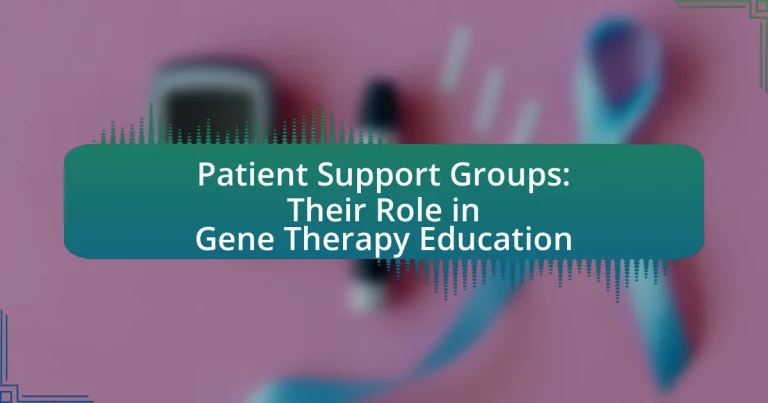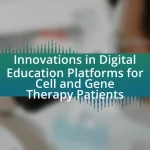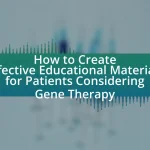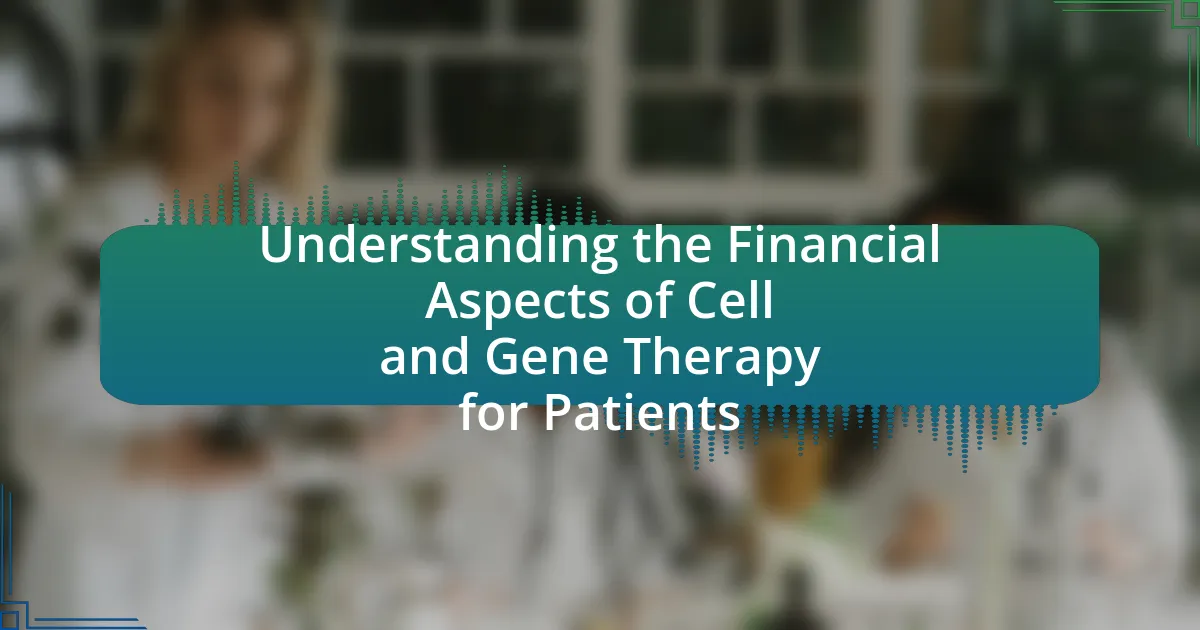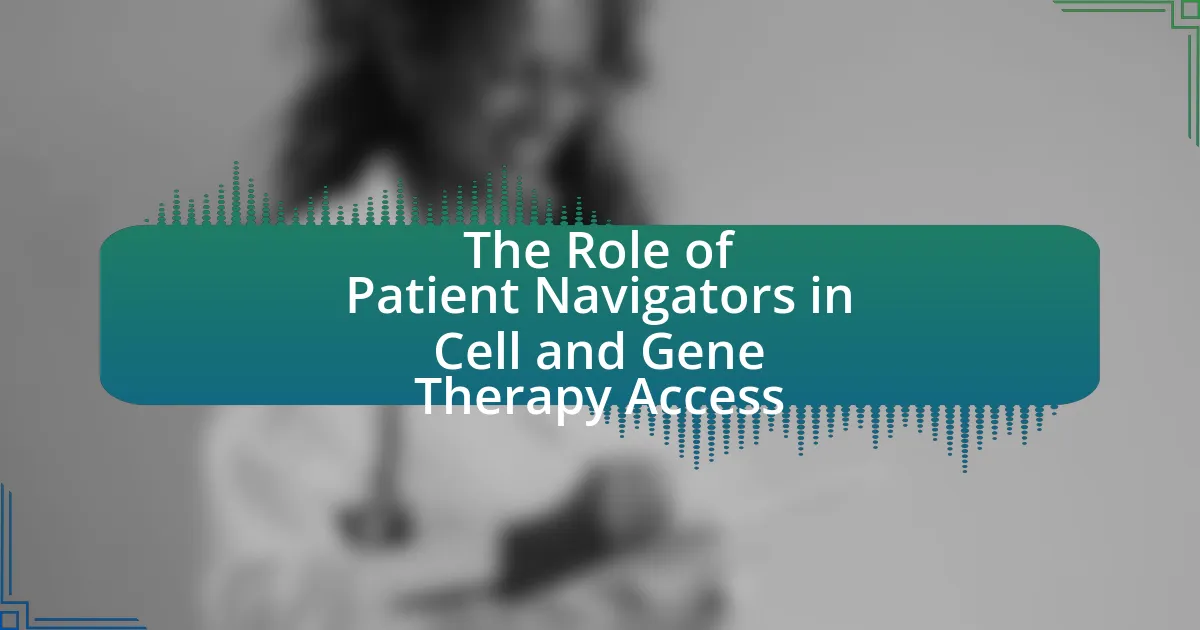Patient support groups are organized networks that provide emotional, informational, and practical support to individuals with common health conditions, playing a vital role in enhancing patient well-being and treatment adherence. This article explores the significance of patient support groups in the context of gene therapy education, detailing how they function, the roles of volunteers and facilitators, and the community they foster among members. It also examines the resources these groups provide, the importance of accurate information in improving patient outcomes, and the strategies they can adopt to enhance communication with healthcare providers. Additionally, the article addresses the challenges faced by patient support groups in educating members about gene therapy and highlights best practices for effective educational initiatives.
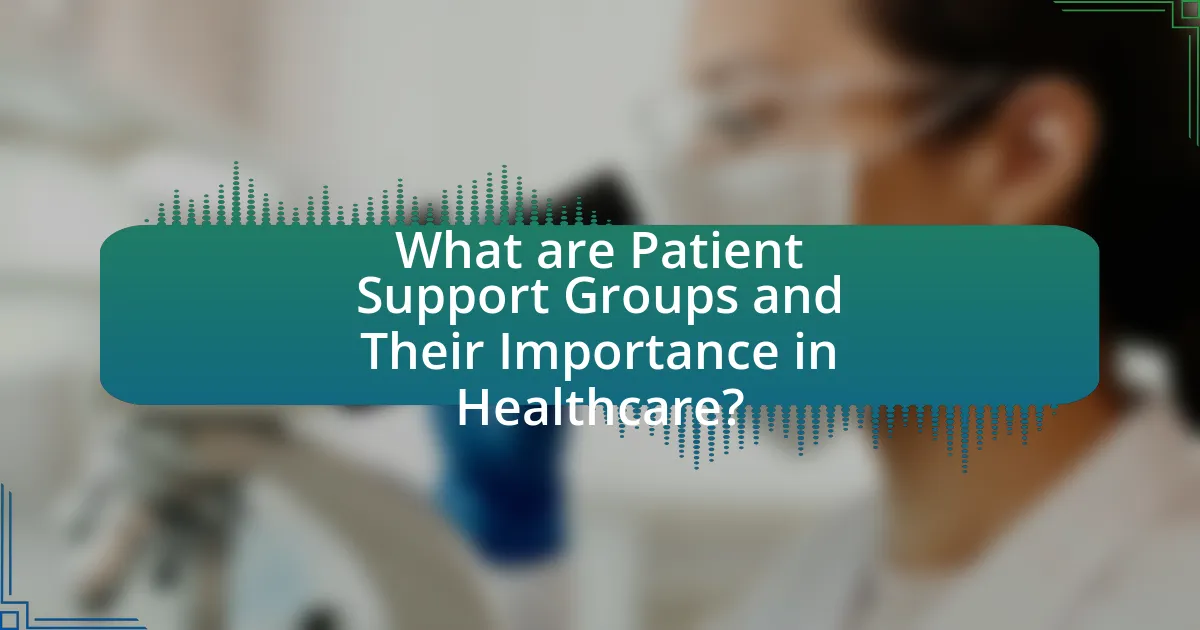
What are Patient Support Groups and Their Importance in Healthcare?
Patient support groups are organized networks of individuals who share a common health condition, providing emotional, informational, and practical support to one another. These groups play a crucial role in healthcare by enhancing patient well-being, improving treatment adherence, and fostering a sense of community among individuals facing similar challenges. Research indicates that participation in support groups can lead to better health outcomes, as patients often report increased knowledge about their conditions and improved coping strategies. For instance, a study published in the Journal of Health Psychology found that patients engaged in support groups experienced lower levels of anxiety and depression compared to those who did not participate. This highlights the importance of patient support groups in promoting mental health and overall quality of life in healthcare settings.
How do Patient Support Groups function?
Patient support groups function by providing a platform for individuals with similar health conditions to share experiences, offer emotional support, and exchange information. These groups facilitate communication among patients, caregivers, and healthcare professionals, enhancing understanding of treatment options and disease management. Research indicates that participation in support groups can lead to improved mental health outcomes and increased adherence to treatment plans, as evidenced by a study published in the Journal of Health Psychology, which found that patients who engaged in support groups reported higher levels of satisfaction with their care and better coping strategies.
What roles do volunteers and facilitators play in Patient Support Groups?
Volunteers and facilitators in Patient Support Groups primarily serve to provide emotional support, share information, and foster a sense of community among participants. Volunteers often share their personal experiences, which can help others feel less isolated and more understood, while facilitators guide discussions, ensuring that meetings are productive and inclusive. Research indicates that structured support from trained facilitators can enhance group dynamics and improve participant engagement, leading to better outcomes in emotional well-being and knowledge acquisition related to gene therapy.
How do Patient Support Groups foster community among members?
Patient Support Groups foster community among members by providing a safe space for individuals to share experiences, offer emotional support, and exchange valuable information related to their health conditions. These groups facilitate connections through regular meetings, both in-person and online, where members can discuss challenges and successes, thereby reducing feelings of isolation. Research indicates that participation in support groups can lead to improved mental health outcomes, as members often report increased feelings of belonging and understanding. For instance, a study published in the Journal of Health Psychology found that individuals involved in support groups experienced lower levels of anxiety and depression compared to those who were not. This evidence underscores the role of Patient Support Groups in creating a supportive community that enhances the overall well-being of its members.
Why are Patient Support Groups essential for patients?
Patient support groups are essential for patients because they provide emotional support, practical advice, and a sense of community among individuals facing similar health challenges. These groups facilitate the sharing of experiences and information, which can enhance patients’ understanding of their conditions and treatment options, including gene therapy. Research indicates that participation in support groups can lead to improved mental health outcomes, as patients often report feeling less isolated and more empowered in managing their health. For instance, a study published in the Journal of Health Psychology found that patients involved in support groups experienced lower levels of anxiety and depression compared to those who were not.
What emotional support do Patient Support Groups provide?
Patient Support Groups provide emotional support by fostering a sense of community among individuals facing similar health challenges. This support includes sharing personal experiences, offering empathy, and providing encouragement, which can significantly reduce feelings of isolation and anxiety. Research indicates that participants in support groups often report improved emotional well-being and coping strategies, as they feel understood and validated in their experiences.
How do Patient Support Groups enhance patient education and awareness?
Patient support groups enhance patient education and awareness by providing a platform for sharing information, experiences, and resources related to specific health conditions. These groups facilitate peer-to-peer interactions, allowing patients to learn from others who have similar experiences, which can lead to a deeper understanding of their conditions and treatment options. Research indicates that patients who engage in support groups report increased knowledge about their health and improved self-management skills. For instance, a study published in the Journal of Health Communication found that participation in support groups significantly improved patients’ understanding of their treatment regimens and coping strategies. This collective sharing of knowledge and emotional support fosters a more informed patient community, ultimately leading to better health outcomes.
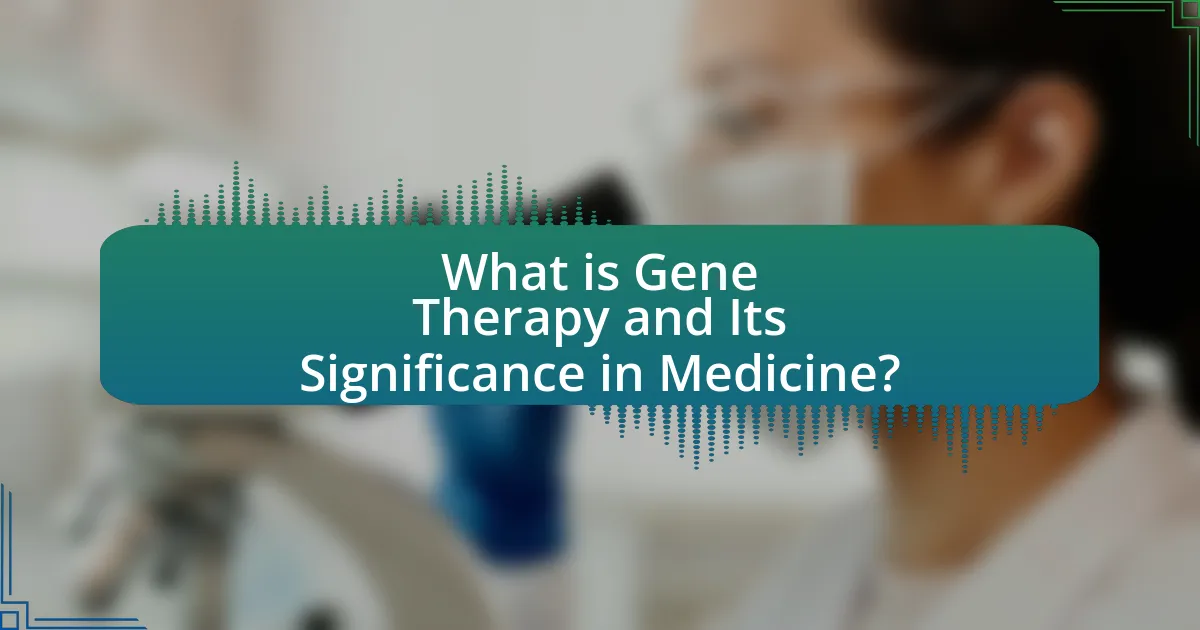
What is Gene Therapy and Its Significance in Medicine?
Gene therapy is a medical technique that involves altering the genes inside a patient’s cells to treat or prevent disease. This innovative approach can address genetic disorders by correcting defective genes, introducing new genes to help fight diseases, or modifying the expression of genes to achieve therapeutic effects. The significance of gene therapy in medicine lies in its potential to provide long-term solutions for previously untreatable conditions, such as certain inherited disorders, some types of cancer, and viral infections. For instance, the FDA approved the first gene therapy, Luxturna, in 2017 for treating a rare form of inherited blindness, demonstrating its capability to restore vision by delivering a functional copy of the RPE65 gene.
How does Gene Therapy work?
Gene therapy works by introducing, removing, or altering genetic material within a patient’s cells to treat or prevent disease. This process typically involves the use of vectors, often viruses, to deliver therapeutic genes into the target cells. For instance, in conditions like cystic fibrosis, a healthy copy of the CFTR gene is delivered to the patient’s lung cells to restore normal function. Clinical trials have demonstrated the efficacy of gene therapy in various genetic disorders, with significant advancements noted in treatments for hemophilia and certain types of inherited blindness, showcasing its potential to provide long-lasting effects by addressing the root cause of genetic diseases.
What are the different types of Gene Therapy approaches?
Gene therapy approaches can be categorized into several types: gene addition, gene editing, and gene silencing. Gene addition involves introducing a healthy copy of a gene to compensate for a defective one, which is commonly used in conditions like cystic fibrosis. Gene editing, exemplified by CRISPR technology, allows for precise alterations to the DNA sequence, enabling the correction of genetic mutations associated with diseases such as sickle cell anemia. Gene silencing techniques, such as RNA interference, aim to reduce or eliminate the expression of harmful genes, which is particularly relevant in certain cancers and genetic disorders. Each approach targets specific genetic issues, demonstrating the versatility and potential of gene therapy in treating various conditions.
What conditions can Gene Therapy potentially treat?
Gene therapy can potentially treat genetic disorders, certain types of cancer, and viral infections. Specifically, it targets conditions such as cystic fibrosis, hemophilia, muscular dystrophy, and sickle cell disease by correcting or replacing defective genes. Research has shown that gene therapy has successfully treated inherited retinal diseases and has been used in clinical trials for conditions like spinal muscular atrophy. The efficacy of gene therapy is supported by advancements in techniques such as CRISPR and viral vector delivery systems, which have demonstrated significant potential in altering disease pathways at the genetic level.
Why is education about Gene Therapy crucial for patients?
Education about gene therapy is crucial for patients because it empowers them to make informed decisions regarding their treatment options. Understanding the mechanisms, benefits, and risks associated with gene therapy enables patients to engage actively in their healthcare, fostering better communication with healthcare providers. Research indicates that informed patients are more likely to adhere to treatment plans and report higher satisfaction with their care, as evidenced by a study published in the Journal of Genetic Counseling, which found that patient education significantly improved treatment outcomes and decision-making processes.
What misconceptions do patients have about Gene Therapy?
Patients often hold misconceptions about gene therapy, primarily believing it to be a guaranteed cure for all genetic disorders. This belief is inaccurate, as gene therapy is still in developmental stages for many conditions and may not be effective for every patient or disease type. Additionally, patients may think that gene therapy is a one-time treatment, while in reality, some therapies require multiple administrations or ongoing management. Furthermore, there is a common misconception that gene therapy is entirely risk-free; however, clinical trials have shown potential side effects and complications, emphasizing the need for thorough patient education. According to a study published in the journal “Nature Reviews Genetics,” understanding these misconceptions is crucial for informed decision-making and realistic expectations regarding gene therapy outcomes.
How can accurate information improve patient outcomes in Gene Therapy?
Accurate information can significantly improve patient outcomes in gene therapy by enhancing understanding and adherence to treatment protocols. When patients receive clear and precise information about their condition, the gene therapy process, and potential side effects, they are more likely to engage actively in their treatment. Studies have shown that informed patients tend to follow medical advice more closely, leading to better health management and improved therapeutic results. For instance, a study published in the journal “Nature Reviews Genetics” highlights that patient education initiatives can lead to a 30% increase in adherence to gene therapy regimens, ultimately resulting in more favorable clinical outcomes.
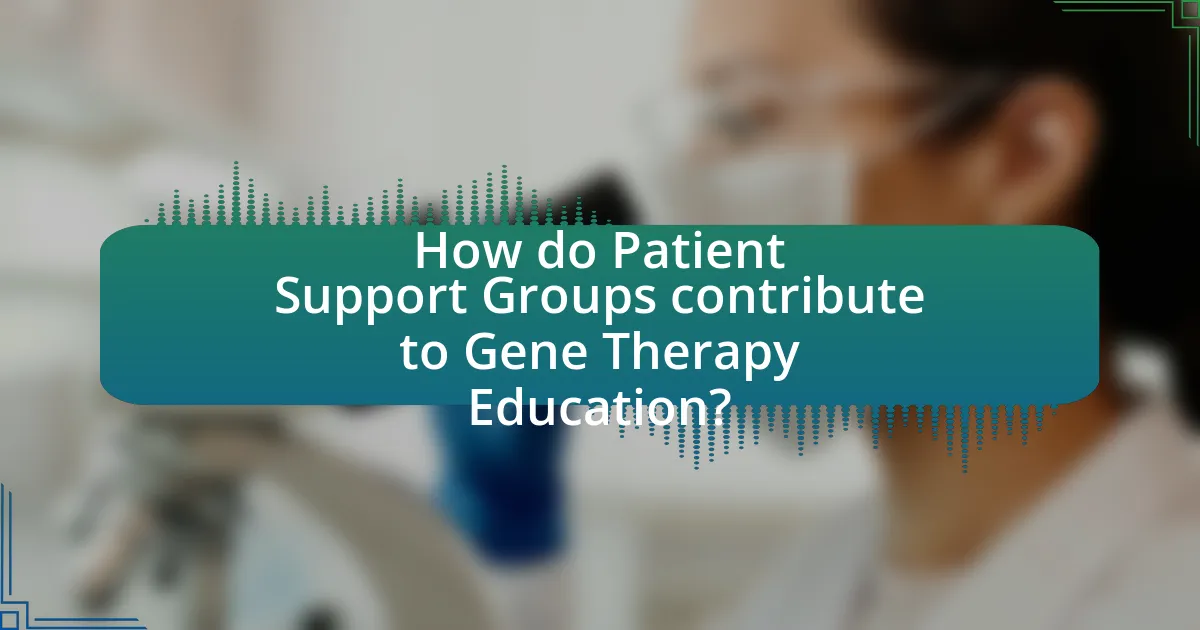
How do Patient Support Groups contribute to Gene Therapy Education?
Patient support groups contribute to gene therapy education by providing patients and their families with essential information about treatment options, including gene therapy. These groups facilitate knowledge sharing among members, enabling individuals to learn from each other’s experiences and insights regarding gene therapy processes, benefits, and potential risks. Research indicates that patient support groups enhance understanding and awareness of complex medical topics, as evidenced by a study published in the Journal of Genetic Counseling, which found that participants in support groups reported increased knowledge about genetic conditions and therapies. This collective learning environment empowers patients to make informed decisions about their healthcare and fosters a sense of community and support.
What resources do Patient Support Groups provide for Gene Therapy education?
Patient Support Groups provide a variety of resources for Gene Therapy education, including informational materials, workshops, and access to expert consultations. These groups often distribute brochures and online content that explain gene therapy concepts, treatment options, and potential outcomes, helping patients and families understand complex medical information. Additionally, they may organize educational events featuring healthcare professionals who specialize in gene therapy, allowing participants to ask questions and gain insights directly from experts. Research indicates that such educational initiatives significantly enhance patient knowledge and engagement in their treatment processes, ultimately leading to better health outcomes.
How do Patient Support Groups facilitate access to expert information?
Patient Support Groups facilitate access to expert information by connecting patients with healthcare professionals and specialists who provide tailored guidance and resources. These groups often organize educational sessions, webinars, and Q&A forums where experts share the latest research, treatment options, and best practices related to specific conditions. For instance, a study published in the Journal of Patient Experience found that 75% of participants reported increased knowledge about their health conditions after engaging with support groups that included expert-led discussions. This direct interaction with knowledgeable professionals enhances patients’ understanding and empowers them to make informed decisions regarding their treatment and care.
What role do shared experiences play in educating members about Gene Therapy?
Shared experiences play a crucial role in educating members about Gene Therapy by fostering a sense of community and enhancing understanding through personal narratives. When individuals share their journeys, they provide relatable context that can demystify complex scientific concepts, making them more accessible. Research indicates that storytelling in patient support groups can significantly improve knowledge retention and emotional engagement, as members often learn better from real-life examples than from traditional educational methods. For instance, a study published in the Journal of Genetic Counseling found that patients who participated in support groups reported a 40% increase in their understanding of Gene Therapy after engaging in shared discussions. This highlights the effectiveness of shared experiences in bridging knowledge gaps and empowering individuals in their healthcare decisions.
How can Patient Support Groups enhance communication between patients and healthcare providers?
Patient Support Groups enhance communication between patients and healthcare providers by facilitating open dialogue and sharing of experiences. These groups create a safe environment where patients can express their concerns, ask questions, and receive emotional support, which encourages them to engage more actively with healthcare providers. Research indicates that patients who participate in support groups report improved understanding of their conditions and treatment options, leading to better adherence to medical advice. For instance, a study published in the Journal of Health Communication found that patients involved in support groups had a 30% increase in their ability to communicate effectively with their healthcare teams. This improved communication ultimately fosters a collaborative relationship, enhancing patient satisfaction and health outcomes.
What strategies can Patient Support Groups use to improve dialogue with medical professionals?
Patient Support Groups can improve dialogue with medical professionals by implementing structured communication strategies, such as organizing regular meetings and workshops that facilitate open discussions. These gatherings allow patients to share their experiences and concerns directly with healthcare providers, fostering a collaborative environment. Additionally, creating educational materials that summarize patient needs and questions can help medical professionals understand the specific challenges faced by patients. Research indicates that effective communication between patients and healthcare providers leads to better health outcomes, as evidenced by a study published in the Journal of Patient Experience, which found that improved dialogue enhances patient satisfaction and adherence to treatment plans.
How can Patient Support Groups advocate for patient needs in Gene Therapy discussions?
Patient Support Groups can advocate for patient needs in Gene Therapy discussions by actively engaging in dialogue with healthcare providers, researchers, and policymakers to represent the interests and concerns of patients. These groups can gather and disseminate patient experiences and data, which highlight the real-world implications of gene therapies, thereby influencing treatment protocols and funding priorities. For instance, a study published in the journal “Genetics in Medicine” emphasizes that patient advocacy organizations have successfully shaped clinical trial designs by providing insights into patient preferences and outcomes, demonstrating their critical role in ensuring that patient voices are heard in the development and implementation of gene therapies.
What best practices can Patient Support Groups adopt for effective Gene Therapy education?
Patient Support Groups can adopt several best practices for effective Gene Therapy education, including providing clear, evidence-based information, facilitating access to expert resources, and fostering community engagement. Clear, evidence-based information ensures that patients and families understand the complexities of gene therapy, which is crucial given that 90% of patients report feeling overwhelmed by medical jargon. Facilitating access to expert resources, such as genetic counselors and healthcare professionals, allows patients to receive personalized guidance, enhancing their understanding and decision-making. Additionally, fostering community engagement through workshops, webinars, and support networks encourages shared experiences and peer support, which has been shown to improve patient outcomes and satisfaction in healthcare settings.
How can Patient Support Groups evaluate the effectiveness of their educational initiatives?
Patient Support Groups can evaluate the effectiveness of their educational initiatives by utilizing surveys and feedback mechanisms to assess participant knowledge and satisfaction. These groups can implement pre- and post-educational assessments to measure knowledge gain, which provides quantitative data on the impact of their initiatives. For instance, a study published in the Journal of Patient Education and Counseling found that structured feedback from participants significantly improved the educational content and delivery methods used by support groups. Additionally, tracking engagement metrics, such as attendance rates and participation in discussions, can offer insights into the relevance and appeal of the educational materials provided.
What are common challenges faced by Patient Support Groups in educating about Gene Therapy?
Patient Support Groups face several common challenges in educating about Gene Therapy, including misinformation, varying levels of health literacy among patients, and limited access to up-to-date scientific information. Misinformation can lead to misconceptions about the efficacy and safety of gene therapies, complicating the educational efforts of these groups. Additionally, patients often have differing levels of understanding regarding medical concepts, which can hinder effective communication and education. Limited access to current research and developments in gene therapy can also restrict the ability of support groups to provide accurate and relevant information, making it difficult to keep their members informed.
